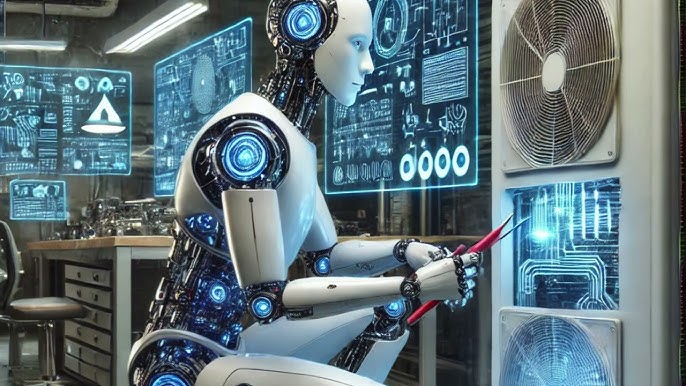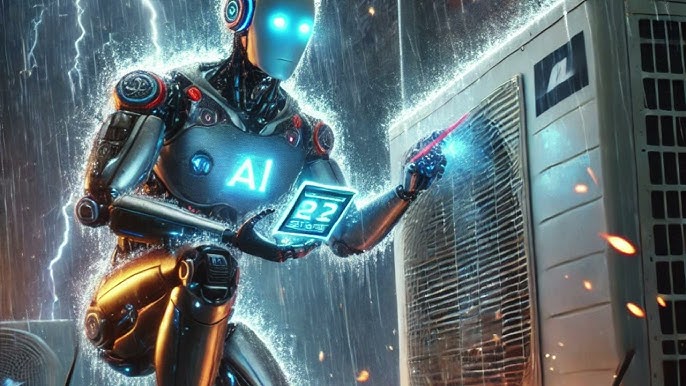In the rapidly advancing world of technology, self-learning HVAC systems are emerging as a game-changer in the realm of indoor climate control. These sophisticated systems leverage the power of artificial intelligence to optimize heating, ventilation, and air conditioning operations, making them more efficient and responsive to the needs of the occupants. As we delve deeper into the capabilities of these systems, it’s important to understand how they work and the benefits they bring to both residential and commercial environments.

Understanding Self-Learning HVAC Systems
Self-learning HVAC systems are equipped with advanced sensors and algorithms that allow them to learn from the environment they operate in. By collecting data about temperature, humidity, occupancy, and usage patterns, these systems can adjust their operations autonomously to maintain optimal indoor conditions. The goal is to enhance comfort while reducing energy consumption.
How Do They Work?
At the heart of self-learning HVAC systems is the integration of artificial intelligence. These systems utilize machine learning algorithms to predict the heating and cooling needs of a building. Over time, they become more accurate in their predictions, leading to improved efficiency and comfort. AI for Indoor Air Quality monitoring is a crucial component, ensuring that the air quality remains at optimal levels.
Benefits of Self-Learning HVAC Systems
The advantages of implementing a self-learning HVAC system are numerous. Firstly, they offer significant energy savings by optimizing the use of heating and cooling resources. This not only reduces utility bills but also contributes to environmental sustainability. Additionally, these systems enhance indoor comfort by maintaining consistent temperatures and improving air quality. Predicting HVAC Breakdowns with AI further ensures system reliability.
Key Features of Self-Learning HVAC Systems
Adaptive Control
One of the standout features of self-learning HVAC systems is their ability to adapt to changing conditions. Whether it’s a sudden change in weather or fluctuations in occupancy, these systems adjust their operations in real-time to maintain comfort.
Predictive Maintenance
By analyzing data trends, self-learning HVAC systems can anticipate potential failures and schedule maintenance proactively. This predictive maintenance approach minimizes downtime and extends the lifespan of the equipment. Learn more about HVAC Predictive Maintenance.
Integration with Smart Home Technology
These systems can seamlessly integrate with other smart home devices, allowing for centralized control and automation. This integration enhances user convenience and maximizes the efficiency of home operations.
The Future of HVAC: What to Expect
The future of self-learning HVAC systems is promising, with ongoing advancements in AI and machine learning paving the way for even more intelligent solutions. As these systems become more accessible, we can expect them to play a pivotal role in achieving energy-efficient buildings worldwide.
Challenges and Considerations
While the benefits are clear, there are challenges to consider. The initial cost of installation and potential security concerns related to data privacy are factors that need to be addressed. Nevertheless, the long-term savings and environmental benefits often outweigh these initial hurdles.
Case Studies: Success Stories
Several organizations have successfully implemented self-learning HVAC systems. For instance, a commercial building in New York reported a 30% reduction in energy consumption within the first year of implementation. Such case studies highlight the tangible benefits and encourage wider adoption.

FAQs
What are self-learning HVAC systems?
Self-learning HVAC systems are advanced climate control systems that use artificial intelligence to optimize heating, ventilation, and air conditioning operations by learning from environmental data.
How do self-learning HVAC systems save energy?
These systems save energy by analyzing data to adjust their operations efficiently, reducing unnecessary heating or cooling and minimizing energy waste.
Are self-learning HVAC systems worth the investment?
Yes, despite the initial costs, the long-term energy savings and improved comfort levels make them a worthwhile investment for many homeowners and businesses.
For further insights into how AI models are enhancing HVAC design and performance, visit this article.
This article contains affiliate links. We may earn a commission at no extra cost to you.
